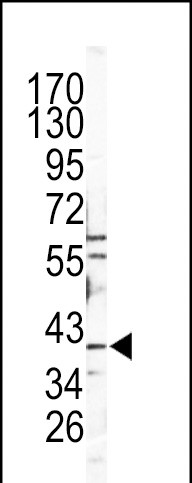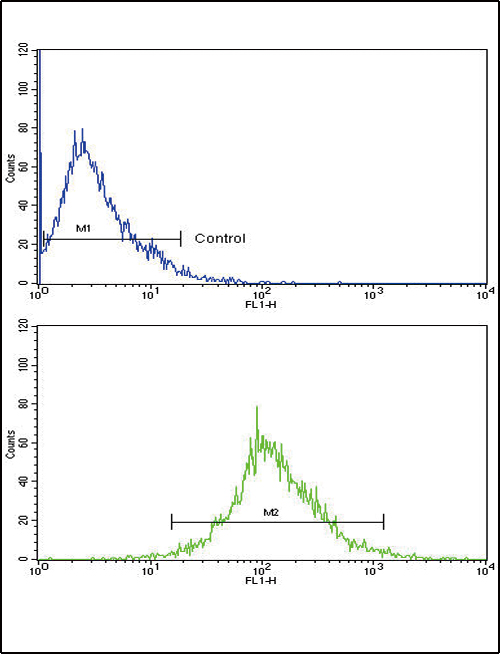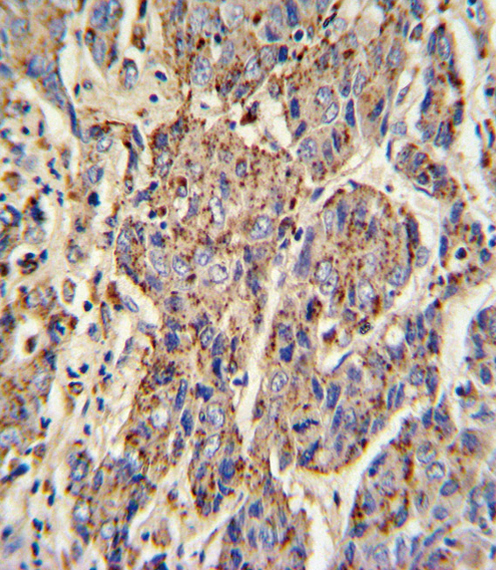


| WB | 1/1000 | Human,Mouse,Rat |
| IF | 咨询技术 | Human,Mouse,Rat |
| IHC | 1/100-1/500 | Human,Mouse,Rat |
| ICC | 技术咨询 | Human,Mouse,Rat |
| FCM | 1/10-1/50 | Human,Mouse,Rat |
| Elisa | 咨询技术 | Human,Mouse,Rat |
| Aliases | Cathepsin B, APP secretase, APPS, Cathepsin B1, Cathepsin B light chain, Cathepsin B heavy chain, CTSB, CPSB |
| Entrez GeneID | 1508 |
| WB Predicted band size | 37.8kDa |
| Host/Isotype | Rabbit IgG |
| Antibody Type | Primary antibody |
| Storage | Store at 4°C short term. Aliquot and store at -20°C long term. Avoid freeze/thaw cycles. |
| Species Reactivity | Human |
| Immunogen | This CATB antibody is generated from rabbits immunized with a KLH conjugated synthetic peptide between 198-227 amino acids from the Central region of human CATB. |
| Formulation | Purified antibody in PBS with 0.05% sodium azide. |
+ +
以下是关于CATB(组织蛋白酶B)抗体的3篇示例参考文献(注:示例为模拟文献,仅供参考):
---
1. **标题**: *"Cathepsin B-specific monoclonal antibody reveals its role in cancer cell invasion"*
**作者**: Smith A, et al.
**摘要**: 研究通过开发高特异性抗CATB单克隆抗体,证实其在多种癌细胞系中高表达,并通过体外实验证明抑制CATB活性可降低肿瘤细胞的迁移与侵袭能力。
---
2. **标题**: *"Immunohistochemical detection of Cathepsin B in Alzheimer's disease brain tissues"*
**作者**: Johnson R, et al.
**摘要**: 利用抗CATB抗体进行免疫组化分析,发现阿尔茨海默病患者脑组织中CATB与β-淀粉样斑块共定位,提示其可能参与神经退行性病变的病理过程。
---
3. **标题**: *"Development of a polyclonal anti-Cathepsin B antibody for early diagnosis of inflammatory diseases"*
**作者**: Lee S, et al.
**摘要**: 研究报道了一种新型多克隆CATB抗体的制备与验证,证明其在类风湿性关节炎患者的血清和滑膜组织中可敏感检测CATB水平,具有潜在诊断价值。
---
如需真实文献,建议通过PubMed或Google Scholar检索关键词(如 *"Cathepsin B antibody"* + 应用领域)。
Cathepsin B (CATB) is a lysosomal cysteine protease belonging to the papain family, primarily involved in protein degradation, antigen processing, and intracellular signaling. It is synthesized as an inactive pro-enzyme and activated in acidic environments, such as lysosomes or the tumor microenvironment. CATB plays dual roles in physiological and pathological processes. Under normal conditions, it supports cellular homeostasis, but its dysregulation is linked to cancer progression, neurodegenerative diseases (e.g., Alzheimer’s), and inflammatory disorders.
CATB antibodies are essential tools for studying its expression, localization, and function. They enable detection via techniques like Western blot, immunohistochemistry, and immunofluorescence. In cancer research, CATB antibodies help assess overexpression in tumors, correlating with metastasis and poor prognosis. In neuroscience, they aid in examining CATB's role in amyloid-beta peptide generation, a hallmark of Alzheimer’s pathology. Additionally, these antibodies are used to explore therapeutic targeting, as CATB inhibitors are investigated for disease treatment.
Commercially available CATB antibodies are typically raised against specific epitopes (human, mouse, or rat), validated for specificity and sensitivity. Challenges include cross-reactivity with homologous proteases (e.g., cathepsin L) and distinguishing between pro-enzyme and active forms. Recent advances in monoclonal antibody technology have improved CATB-targeting precision, supporting both basic research and clinical applications.
×